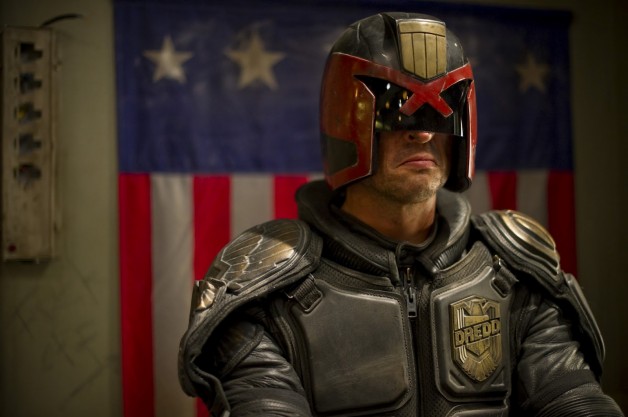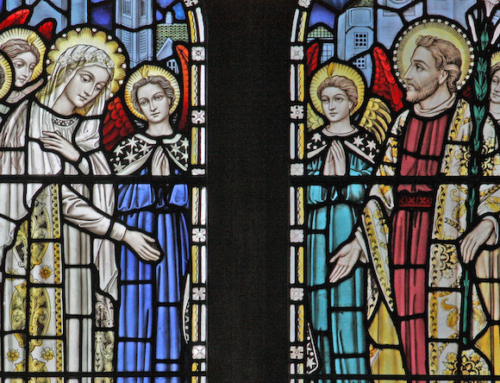Oscars rarely go to movies released during the summer. Movies that make their debut during these hot months are generally not known for intricate plots, sophisticated character development, or penetrating moral analysis of today’s culture. Just as students take a break from the academic year, so too moviegoers take a break from artistic viewing and relax with a thriller, adventure film, or action flick. One of my favorites is the 1995 comic classic Judge Dredd.
The Catholic News Service’s Movie Review Office offers a decent summary of the film:
“Judge Dredd — In a chaotic future society where magistrates have the power to execute felons on the spot, an uncompromising judge (Sylvester Stallone) is framed for murder by a homicidal maniac (Armand Assante) long thought dead.”
As you can see, we have here all the ingredients for a fine summer movie. Of course, before viewing one should see what rating the Movie Review Office gives the film. In this case we find:
“Much mindless murder and mayhem, a twisted sense of law enforcement and a few instances of profanity. O (R)”
O? In case one is unfamiliar with the Catholic Media Ratings, O stands for “morally offensive,” the most serious category and a basic prohibition on viewing said movie. This rating is usually reserved for extremely violent, sexually explicit, and profanity laden films. Think Saw I-IV, or whatever that series is up to these days. How in the world can Judge Dredd, a campy movie based on a popular comic book, containing no nudity or sexual reference and an amount of profanity that one can count on five fingers, receive a moral prohibition as extreme as this?
When questions of this sort arise many people turn to Wikipedia or a Google search, but I turn to the Angelic Doctor. Does St. Thomas have anything that can help sort out this confusion? Of course he does.
In ST I-II, 95, 1 St. Thomas asks whether it is useful for laws to be framed by men. In the second objection he offers Aristotle’s insight in his Ethics that “it would be better for the execution of justice to be entrusted to the decision of judges, than to frame laws in addition.” In his reply St. Thomas refutes this claim, again with Aristotle, for three reasons. First, because it is easier to find a few men able to frame right laws than leave judgment to many individuals. Second, because framed laws can be more universal. Third, because individual judges can be affected by “love, hatred, or some kind of cupidity; wherefore their judgment is perverted.”
So St. Thomas’ problem with Judge Dredd would seem to be its lack of understanding the best way to craft correct laws. But the ardent Judge Dredd supporter might retort: “Sure, but the judges are not meant to craft laws, they are meant to carry out the Law itself. The problem is not with judges per se, but with corrupt judges.”
This leads us to the second reason I think St. Thomas would be opposed to the movie. In ST I-II, 96, 2, St. Thomas asks whether it belongs to human law to repress all vices. An affirmative answer is clearly the premise of the movie—judges enforce an extremely strict moral code. To give an example, a computer hacker named Ferguson who has just been released from prison breaks into a food machine to hide from a street fight. This interchange ensues after Judge Dredd finds Ferguson and sentences him to five years in prison:
Ferguson: Five years? No! No! I had no choice. They were killing each other in there!
Dredd: You could have gone out the window.
Ferguson: Forty floors? It would have been suicide!
Dredd: Maybe, but it’s legal.
This kind of discourse follows pretty easily from the second objection in ST, I-II, 96, 2: “The intention of the lawgiver is to make the citizens virtuous. But man cannot be virtuous unless he forbears from all kinds of vice. Therefore it belongs to human law to repress all vices.”
St. Thomas answers this objection with the following:
“The purpose of human law is to lead men to virtue, not suddenly, but gradually. Wherefore it does not lay upon the multitude of imperfect men the burdens of those who are already virtuous, viz. that they should abstain from all evil. Otherwise these imperfect ones, being unable to bear such precepts, would break out into yet greater evils.”
Human law must take into account the subjects it seeks to direct and St. Thomas, following St. Augustine, realizes that human law cannot lay too heavy a burden upon imperfect men lest they despair of reform and moral development. This lack of understanding of human law, at least from a Thomistic perspective, may be called morally offensive. The movie portrays a dangerous view of law that would in the end (as it does in the movie) lead to more violence and criminal behavior.
Judge Dredd may be zealous in his prosecution of an extreme form of Law, but zeal cannot change the morally offensive character of that Law.
✠
Image: Karl Urban in Dredd (2012)







